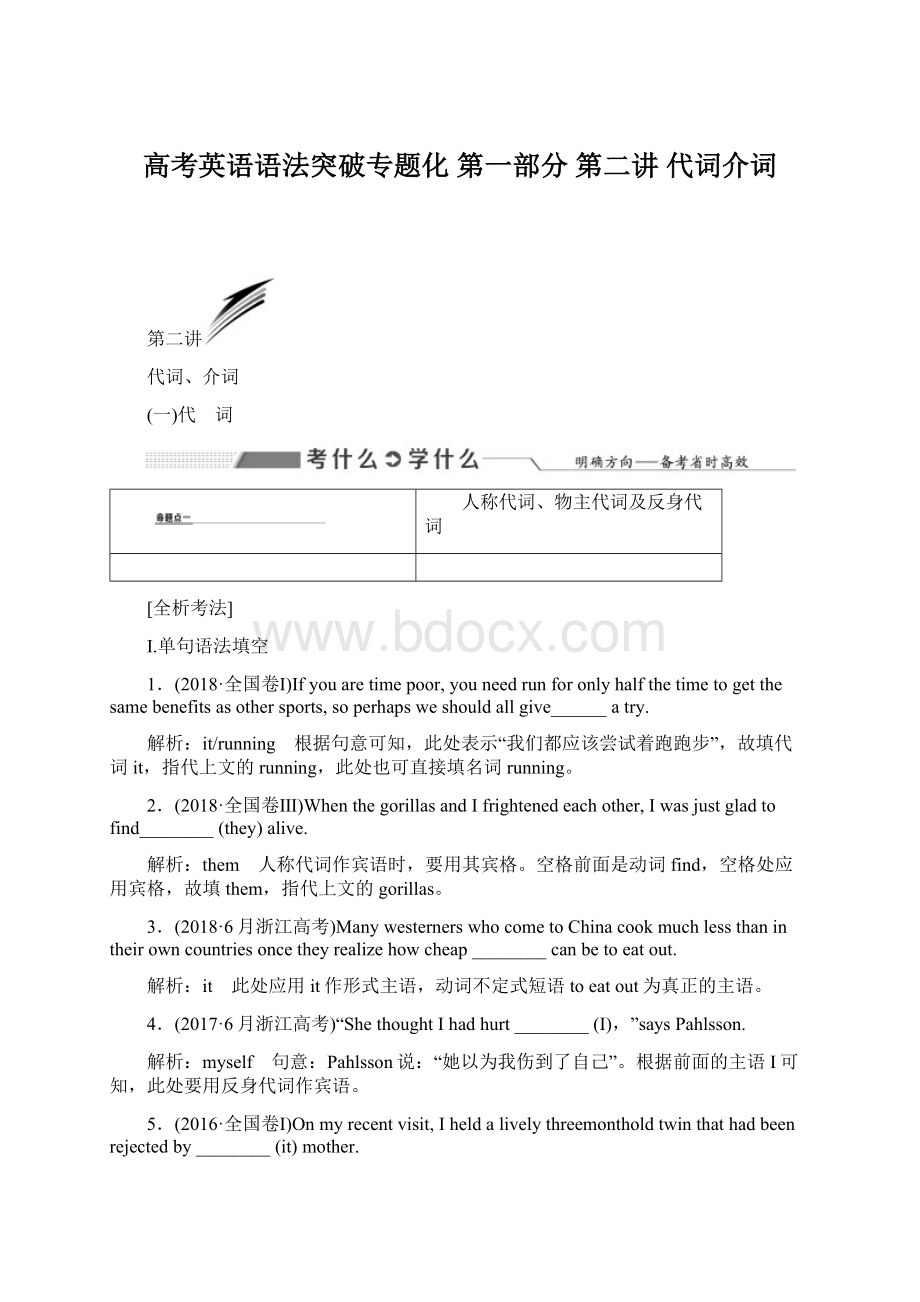高考英语语法突破专题化第一部分第二讲代词介词Word格式.docx
《高考英语语法突破专题化第一部分第二讲代词介词Word格式.docx》由会员分享,可在线阅读,更多相关《高考英语语法突破专题化第一部分第二讲代词介词Word格式.docx(26页珍藏版)》请在冰豆网上搜索。

”Awomanonthebusshouted,“Ohdear!
It'
s__________(I).”
me/mine 根据上文语境可知,此处的It如果指前面的suitcase的话,那么此空需要使用名词性物主代词mine,表示“那个箱子是我的”;
如果指前面的anyone的话,那么此空需要用I的宾格形式me,表示“是我在上一站丢失了手提箱”。
8.(2014·
辽宁高考)Raiseyourlegandlet________stayintheairforseconds.
it 句意:
抬起你的腿让它在空中停几秒钟。
此处填it指代前面出现的“yourleg”。
9.(2014·
广东高考)Lastyear,mybrotherandIwenttoMiamiforavacation.Someofmyfriendswhohadbeentherebeforesaid________wasawonderfulholidaydestination.
it 从空格后的“awonderfulholidaydestination”可知,这个地方就是Miami,故填it指代前面提到的地点。
Ⅱ.单句改错
全国卷Ⅲ)Ihaddonemyselfhomework,butIwasshy.________________
myself→my 此处表示我已经完成了我的家庭作业。
my是形容词性物主代词,作homework的定语,myself不作定语。
2.(2017·
全国卷Ⅲ)Aboutonemonthafterthisphotowastaken,Ienteredmysecondyearofhighschool...Thispictureoftenbringsbacktomemanyhappymemoriesofyourhighschooldays.________________
your→my 此处意为“这张照片常常让我想起我高中时的许多快乐的记忆”,故应该使用代词my。
3.(2016·
全国卷Ⅱ)Ifwegoonatripabroad,wecanbroadenyourviewandgainknowledgewecannotgetfrombooks.
________________
your→our 根据前面的主语we可知,此处要用our,表示“我们能够开阔我们的视野”。
4.(2016·
全国卷Ⅲ)Atfirst,IthoughtIkneweverythingandcouldmakedecisionsbyyourself.________________
yourself→myself 根据前面的I可知,此处指“我自己做决定”,故应用myself。
四川高考)Whenhecameback,Ifoundabunchofflowersinherhand.________________
her→his 由前面的“Whenhecameback”可知,这束花是在“他的(his)”手里。
全国卷Ⅰ)Wemustfindwaystoprotectyourenvironment.Ifwefailtodoso,we'
lllivetoregretit.
your→our/the 依据前后句的语境及逻辑关系可知,前面的主语是we,句中的your与上下文相悖,应当改为our/the才能使句意通顺。
7.(2015·
全国卷Ⅱ)Fiveminuteslater,Tonysawparents.
saw后加his 根据语境及英语表达习惯,应当在parents前加上与主语Tony相一致的物主代词his。
8.(2015·
四川高考)AsItoldyoulasttime,Imadethreenewfriendshere...butI'
mafraidI'
lllosetheirfriendship.WhatdoyouthinkIshoulddo?
Ifyouwereme,wouldyoutalktohim?
him→them 根据上文可知,此处指作者交的三个新朋友,故用them。
9.(2015·
浙江高考)Closetotheschooltherewasabeautifulparkwithmanytreesaroundthem.________________
them→it abeautifulpark为单数,故应用it指代前面的单数可数名词park。
[谨记规则]
(一)人称代词、物主代词与反身代词
1.基本用法
类别
主格
宾格
形容词性物主代词
名词性
物主代词
反身代词
功能
作主语
作宾语、同位语等
作定语
作主语、表语或宾语
作宾语、表语或同位语
第一人称
I(我)
me
my
mine
myself
we(我们)
us
our
ours
ourselves
第二人称
you(你)
you
your
yours
yourself
you(你们)
yourselves
第三人称
he(他)
him
his
himself
she(她)
her
hers
herself
it(它)
it
its
itself
they(他们)
them
their
theirs
themselves
2.反身代词的习惯用法
与介词搭配
byoneself独自地 foroneself亲自
ofoneself自动地inoneself本质上;
本身
与动词搭配
cometooneself 苏醒;
恢复知觉
dressoneself打扮;
自己穿衣
devoteoneselfto致力于;
献身于
behaveoneself举止规矩有礼;
检点
applyoneselfto专心致志于
helponeselfto随便吃/用
enjoyoneself玩得开心
seatoneself就座;
入席
makeyourselfathome别客气
adapt/adjustoneselfto适应于
teachoneself自学
speaktooneself自言自语
thinkforoneself独立思考
(二)it的用法
1.it的基本用法
用法
例句
指天气、季节、时间、距离、环境等
Itisearlyspring,butitisalreadyhot.现在是初春,但是天气已经很热了。
代替前面提过的事物、群体、想法、内容等或代替指示代词
Althoughhedidn'
tlikeit,Idecidedtoseethemovieanyway.
尽管他不喜欢看这部电影,但我还是决定去看一看。
指不知性别的孩子和婴儿或不明确的人(由于某种原因而不知对方是谁)
Whatwillyoucallitifitisaboy?
要是男孩的话,你会给他取个什么名字?
2.it作形式主语或形式宾语
常用句型
it作形式主语
Itisapity/shamethat... 真可惜……
Itisnowonderthat...难怪……
Itseems/appearsthat...似乎/看来……
Itlooks/seemsasif/asthough...看起来好像……
Ithappensthat...碰巧……
Itoccursto/comesto/strikes/hitssb.that...
某人突然想起……
Itissaid/reportedthat...据说/据报道……
Itiscertainthat...……是一定的
Itisnouse/gooddoing...做……没有用/好处
Ittakessb.sometimetodo...做……花费某人若干时间
it作形式宾语
①主语+think/believe/suppose/consider/feel/make/keep...+it+adj./n.+for/ofsb.todo/that从句
②主语+think/believe/suppose/consider/feel/make/keep...+it+useless/worth/worthwhile/nouse/nogood/awasteoftime/money/energy...+doing...
3.it的常用短语或句型
makeit 获得成功;
赶上
Seetoitthat...确保……
counton/relyon/dependonitthat... 相信……
assomeoneputsit像某人所说的那样
Whenitcomesto...当涉及/谈到……
Ican'
thelpit(...)(……)我没办法/情不自禁
Itakeitthat...我理解的是……
It'
s(high)timethatsb.did/shoulddosth.
是某人该做某事的时候了
sthefirst/second/...timethatsb.have/hasdonesth.
这是某人第一次/二次/……次做某事了
Itis/hasbeen...since...自从……已过了……时间了
Itwillbe/was...before...要过……时间才……/在……之前已过了……时间
不定代词
单句改错
全国卷Ⅰ)ThefirsttimeIwentthere,theywerelivinginasmallhousewithdogs,ducks,andanotheranimals.________________
another→other another“又一,再一”修饰可数名词单数,可数名词复数前用other,意为“其他的”。
2.(2015·
陕西高考)Mysoccercoachretiredlastweek.Iwantedtodoanythingspecialforhimathisretirementparty.________________
anything→something something一般用在肯定句中,表示“一些事”;
anything一般用在疑问句和否定句中。
此处是表示某件事而不是任何事情。
3.(2015·
四川高考)We'
vebeenspendingalotoftimesinginginkaraokebars.It'
sbeenthreeSaturdaysnowanditreallycostsmemany.________________
many→much 此处指的是花费很多钱,代指不可数名词,故用much。
many用来指代可数名词复数。
1.both,all,either,neither与none的区别
代词
用 法
both
(1)表示“两者(都)”。
(2)作主语时,谓语动词用复数形式。
(3)与not连用表示部分否定,意为“两者并不都……”。
(表示全部否定需用neither)
all
(1)指三者或三者以上的人或物的“全部”。
(2)作主语,指人时,谓语动词通常用复数形式;
指事物的整体或抽象概念时,谓语动词通常用单数形式。
(3)与not连用表示部分否定。
(表示完全否定需用none)
either
(1)表示“(两者中的)任何一个”。
(表示三者或三者以上的人或物中的“任何一个”需用any)
(2)作主语时,谓语动词用单数形式。
neither
(1)表示“(两者)都不”。
(2)单独作主语时,谓语动词用单数形式。
(3)后接of短语作主语时,谓语动词既可用单数形式,也可用复数形式。
none
(1)表示“(三者及三者以上中)无一个”或“没有一点儿”。
(2)后接of短语作主语时,谓语动词既可用单数形式,也可用复数形式。
(3)既可指代可数名词,也可指代不可数名词。
2.each与every的区别
each
(1)强调个体,可作代词和形容词,修饰单数可数名词,指两者或两者以上中的“每一个”。
(2)可以与of短语连用;
可作主语、宾语、同位语和定语。
作主语时,谓语动词用单数形式;
作同位语时,谓语动词的数和主语保持一致。
every
(1)强调(整体中的)每一个,只能作定语,修饰单数可数名词,表示三者或三者以上中的“每一个”。
(2)与not连用构成部分否定。
(3)可用来表示“每隔”。
(4)不可与of短语连用。
3.theother,another,others与theothers的区别
theother
可单独使用,特指两者中的“另一个”或两部分中的“另一部分”。
another
泛指三者或三者以上的人或物中的“另一个”,代替单数可数名词。
另外,another后可接“基数词/few+复数名词(名词表示的事物被看作一个整体)”,表示“另外的……(多少)”。
others/
theothers
others只能单独使用,表示泛指意义,意为“其他的人或事物”,常与some连用。
特指“整体中除去一部分后剩余的全部人或事物”时用theothers。
4.none,nothing与noone/nobody的区别
(1)特指语境中提到的人或物,强调数量。
(2)后可接of短语,可回答以howmany,howmuch引导的特殊疑问句。
nothing
(1)指物,表泛指。
(2)不可接of短语,可回答what引导的特殊疑问句。
noone/
nobody
(1)常指人,仅用于指代可数名词单数。
(2)不可接of短语,可回答以who引导的特殊疑问句。
5.复合不定代词的用法
某……
任何……
每个……;
所有……
没有……
人
someone/
somebody
anyone/
anybody
everyone/everybody
物
something
anything
everything
[知识拓展] 复合不定代词构成的习惯搭配:
nothingbut 仅仅;
只是
anythingbut决不
somethingof有几分;
略微
orsomething诸如此类的人或物
somethingelse别的东西;
另外一件事
fornothing免费
6.表数量的不定代词的用法
表示意义
含义
few
修饰或代替可数名词
否定含义
几乎没有
afew
肯定含义
几个;
一些
little
修饰或代替不可数名词
alittle
少量;
一点点
many
许多
much
语法填空解题“2定向”
1.通过句子成分确定所填代词的形式
(1)如果作主语,则用人称代词的主格;
(2)如果作宾语或表语,则用人称代词的宾格;
(3)如果作定语,则用形容词性物主代词;
(4)如果作宾语、表语或同位语且又反射到句子主语,则用反身代词。
2.通过句式结构和“指代”,判断是否用it
(1)如果指代上文提到的同一个事物,则用it;
(2)如果指代天气、时间、距离或环境情况则用it;
(3)如果作形式主语或形式宾语,则用it;
(4)注意一些固定用法:
dislike/hate/appreciate/dependon/seeto...+it+从句。
据第1条解题
1.Helivesaveryregularlife,studyingeverydayandneverallowinghimself(he)tofallbehindinhisschoolwork.
2.Whentoldthatitwasalosstohumans,thefarmersburstintolaughterandresponded,“Ourreallossisour(we)decreasingincome.”
3.Whilemakingachoicefromvariouswaysofspendingourtime,weoughttoensuresomethingthatrestoresourlostenergyandcheersus(we)up.
4.Butshelearnedalotassheworked,andheremployerallowedhertousehis(he)largelibrary.
5.However,whileitisfuntokeepupwiththelatestnews,wemayactuallybeputtingourselves(we)indanger.
6.Theyhadtochasetheoverprotectivemotherawayfirst,sothatthey(them)couldgetcloseenoughtorescuethebaby.
7.Yesterdayevening,justbeforedusk,Ispottedapigeonbadlytiedupwithasharpkitestring,hittingthewallandthetreebranchestofreehimself(he)fromthestring.
据第2条解题
8.WebelievethatitistheSilkRoadthatwillhelptorealizethepeaceanddevelopmentofthisarea.
9.Realizingitwasourlasthighschoolsportsmeeting,wedecidedtomakeitanunforgettableexperienceforallofus.
10.Givenhope,Iamconvincedthatabreakthroughcancomeatanyageifwehavefaithinourselvesandkeeplearningandworkingforit.
11.Unliketho